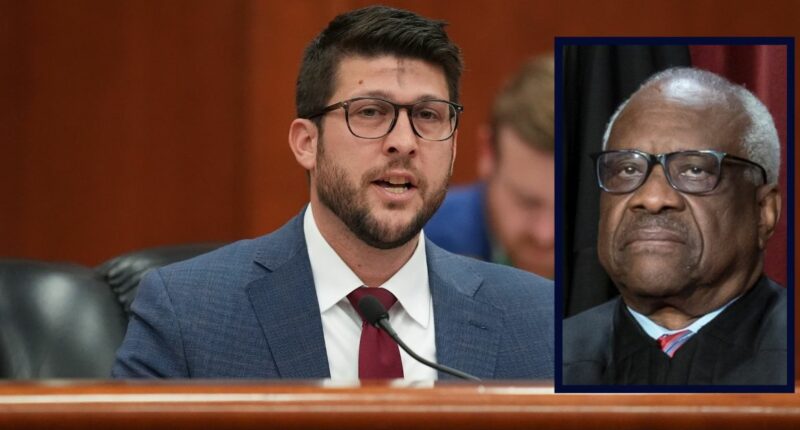Share this @internewscast.com
Left: Florida’s Attorney General James Uthmeier addresses an assembly with Gov. Ron DeSantis and the state cabinet at the Florida capitol in Tallahassee, Florida, on Wednesday, March 5, 2025 (AP Photo/Rebecca Blackwell, file). Right: Associate Justice Clarence Thomas poses for an official portrait in the East Conference Room of the Supreme Court building on October 7, 2022, in Washington, DC. (Alex Wong/Getty Images).
Conservative Justice Clarence Thomas and at least four other Supreme Court justices, although the exact number remains unspecified, quietly dismissed a request to overturn a federal judge’s ruling that blocked the implementation of SB 4-C, a law imposing state criminal sanctions on illegal immigration in Florida.
The denial on Wednesday of Florida Attorney General James Uthmeier’s request for a stay on U.S. District Judge Kathleen Williams’ preliminary injunction, as it awaits appeal in the 11th U.S. Circuit Court of Appeals, was succinct, consisting of just one line without any additional commentary or reasoning from the Supreme Court.
“The application for stay presented to Justice Thomas and by him referred to the Court is denied,” the order said.
In April, Williams, a Barack Obama appointee, sided with the plaintiffs, the Florida Immigrant Coalition and the Farmworker Association of Florida, granting the temporary restraining order and the injunction they requested. Williams was persuaded by the argument that SB 4-C amounted to an unconstitutional state assertion of immigration enforcement powers that belong to the federal government.
Love true crime? Sign up for our newsletter, The Law&Crime Docket, to get the latest real-life crime stories delivered right to your inbox
Uthmeier, a Republican appointed by Gov. Ron DeSantis, was evidently not convinced that the injunction was “legitimate,” which landed him in hot water with the judge.
At first, in response to the Williams’ April 18 order that he “provide actual notice of the TRO” to any and all “law enforcement officer[s] with power to enforce [S.B.] 4-C,” Uthmeier sent a letter stating that they “should take no steps to enforce [S.B. 4-C], including through arrests or detentions” and “comply” with the restraining order.
Five days later, as Williams recounted, Uthmeier sent a letter saying that there actually wasn’t a “lawful” judicial order “properly” barring enforcement.
In mid-June, after the 11th Circuit had already denied the AG a stay, Williams held Uthmeier in civil contempt of court, dismissing his attempt to explain the discrepancies between the letters and referencing Lewis Carroll’s sequel to “Alice’s Adventures in Wonderland” as she did so. Humpty Dumpty featured prominently in the judge’s writing:
Over a century ago, author and sometime logician Lewis Carroll guided readers through the looking glass. Among the adventures there, we encounter a character who boasts of his mastery of words:
“When I use a word,” Humpty Dumpty said, in rather a scornful tone, “it means just what I choose it to mean—neither more nor less.’
“The question is,” said Alice, “whether you can make words mean so many different things.”
The answer then, as now, is no. Litigants cannot change the plain meaning of words as it suits them, especially when conveying a court’s clear and unambiguous order. Fidelity to the rule of law can have no other meaning.
Williams had earlier noted that Uthmeier was defiant in May interviews, even as he still faced the contempt threat, pledging not to “bow down” to the judge. She quoted him as follows to show that he was defying her “clear and unambiguous order”:
This judge is considering whether or not to hold me in contempt. But I am not going to rubber stamp her order, I’m not going to direct law enforcement to stand down on enforcing the Trump agenda and carrying out Florida’s law. Here’s the thing, there’s not a single law enforcement agency as a party in front of the court in this case.
And as a lawyer, the first day of law school, they tell you about separation of powers, they tell you that a judge can’t order people around who are not under the jurisdiction of the court. So I’m not gonna do that, I’m not going to bow down and withhold my oath.
















